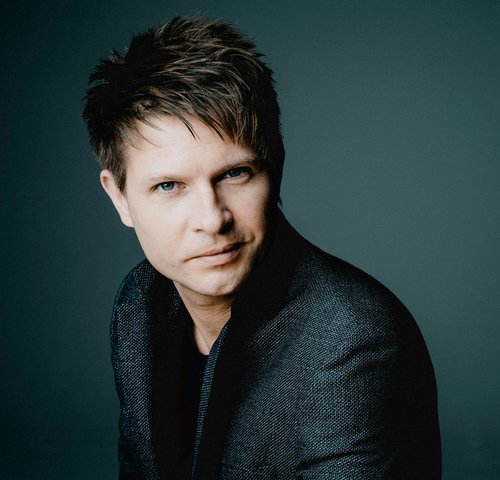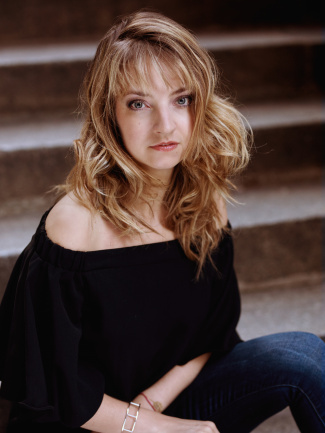A dark, stormy and rewarding Halloween night with Urbański, de la Salle and NSO

Orchestras have to play the occasional chestnut. When they do, it is a good idea to work with a conductor who can shake things up a bit and provide a few unexpected ideas about familiar pieces.
Such was the case Thursday night at the Kennedy Center Concert Hall when Krzysztof Urbański took the podium of the National Symphony Orchestra. He helped shape quirky interpretations of both Chopin’s Piano Concerto No. 2 and Tchaikovsky’s Fourth Symphony.
The Polish conductor, who just turned 37, was last in Washington with the Indianapolis Symphony Orchestra, as part of the 2018 Shift Festival. That ensemble, where he took over as music director in 2011, announced this year that he will conclude his tenure there at the end of the 2020-2021 season.
Urbański likes to feature under-appreciated composers from his native country, and he opened this program with Grażyna Bacewicz’s Overture, premiered in 1943 and never before played by the NSO. It is a brilliant showy piece, with rustling strings racing through endless patterns in its rapid outer sections. A brief slow passage in the middle lulled the ear with smooth triplets, with a return to the fast music, now with the squeal of piccolo and brass punctuation floated on top. Hopefully Urbański will return with one of her symphonies next time.
After the stunning NSO debut of Lise de la Salle in 2017, one expected exceptional pyrotechnics from the French pianist. She delivered that in the daring finale of Chopin’s Second Piano Concerto, whirring through the reams of passagework as Urbański lightly daubed dabs of orchestral color around her. The folk music-inspired section shone in particular, accented by percussive col legno strings.

Rather than focusing only on virtuosity, de la Salle brought another side of her musical personality to the fore as well. Taking her cue from the orchestra’s caressing legato introduction, she pondered the first movement’s themes retrospectively in her solo passages, with exquisite singing tone and tasteful rubato. Her right hand delicately traced out bel canto flourishes in an understated way.
Unfortunately feedback from a listener’s hearing aid blared loudly through most of the movement. The sound apparently bothered the musicians as well, since before the slow movement Urbański gently asked the audience to point out the problem to the person causing it, who was probably unaware of it.
Fixing that issue was worth the trouble because de la Salle and the NSO rendered that middle movement, a heavily perfumed Larghetto, as mistily as a daydream. Her velour touch at the keyboard found its ideal setting in the orchestra’s vanishing warmth. As if to remind us of her technical prowess, the pianist returned after the boisterous finale wearing an outrageous pink witch’s hat for a Halloween-themed encore, Prokofiev’s devilish “Suggestion diabolique,” the last of the Op. 4 Pieces for Piano.
Urbański mostly avoided the temptation to blast through Tchaikovsky’s Fourth Symphony with raucous tempi. The piece certainly had heft, as he gave the NSO brass free rein on the imperious fanfare motif that opens the work and returns many times. In the first movement he emphasized long, smooth lines rather than choppy agitation, easing into the main theme and slowing down even more to make the second theme, introduced by a ruminative bassoon solo, languorous and expansive.
Tender rubato characterized the gentle accompaniment of Nicholas Stovall’s melancholy oboe solo to open the second movement. As other sections, including the beautifully blended cellos, took up that theme, the music remained mostly hushed and introspective. Rather than impress with a lightning rendition of the pizzicato Scherzo, Urbański took a moderate tempo, drawing out expressive turns. His pacing joined the three sections of music together seamlessly.
In the finale the time for introspection was over. As if making up for lost time, Urbański launched the movement with a huge crash of sound. The tempo here was relentless, including in the first appearance of the movement’s section theme, a quotation of the charming folk song “In the Field Stood a Birch Tree.” The second statement of that theme was a rare moment of nostalgic calm in this piece, which rocketed with excitement accelerating to a blazing coda.
The program will be repeated 11:30 a.m. Friday and 8 p.m. Saturday. kennedy-center.org; 202-467-4600
